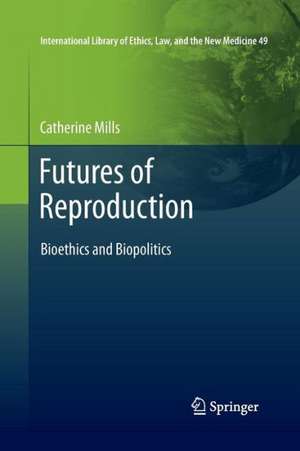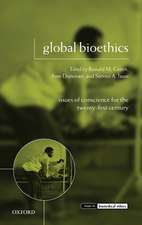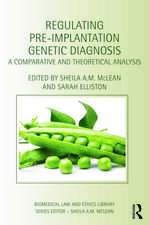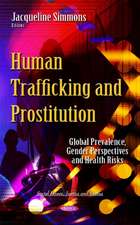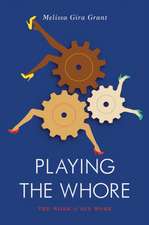Futures of Reproduction: Bioethics and Biopolitics: International Library of Ethics, Law, and the New Medicine, cartea 49
Autor Catherine Millsen Limba Engleză Paperback – 15 iul 2013
| Toate formatele și edițiile | Preț | Express |
|---|---|---|
| Paperback (1) | 633.02 lei 6-8 săpt. | |
| SPRINGER NETHERLANDS – 15 iul 2013 | 633.02 lei 6-8 săpt. | |
| Hardback (1) | 637.59 lei 6-8 săpt. | |
| SPRINGER NETHERLANDS – 27 mai 2011 | 637.59 lei 6-8 săpt. |
Din seria International Library of Ethics, Law, and the New Medicine
- 5%
 Preț: 347.29 lei
Preț: 347.29 lei -
 Preț: 397.25 lei
Preț: 397.25 lei - 15%
 Preț: 635.31 lei
Preț: 635.31 lei - 18%
 Preț: 942.76 lei
Preț: 942.76 lei - 5%
 Preț: 718.65 lei
Preț: 718.65 lei - 15%
 Preț: 634.68 lei
Preț: 634.68 lei - 15%
 Preț: 637.78 lei
Preț: 637.78 lei -
 Preț: 380.07 lei
Preț: 380.07 lei - 18%
 Preț: 959.98 lei
Preț: 959.98 lei - 15%
 Preț: 641.20 lei
Preț: 641.20 lei - 18%
 Preț: 944.19 lei
Preț: 944.19 lei - 15%
 Preț: 636.80 lei
Preț: 636.80 lei - 15%
 Preț: 643.00 lei
Preț: 643.00 lei - 18%
 Preț: 952.89 lei
Preț: 952.89 lei - 15%
 Preț: 643.48 lei
Preț: 643.48 lei - 18%
 Preț: 954.45 lei
Preț: 954.45 lei - 5%
 Preț: 1095.73 lei
Preț: 1095.73 lei - 15%
 Preț: 645.79 lei
Preț: 645.79 lei - 18%
 Preț: 1111.22 lei
Preț: 1111.22 lei - 15%
 Preț: 643.84 lei
Preț: 643.84 lei - 18%
 Preț: 1227.67 lei
Preț: 1227.67 lei - 18%
 Preț: 953.65 lei
Preț: 953.65 lei - 15%
 Preț: 638.57 lei
Preț: 638.57 lei - 5%
 Preț: 1101.21 lei
Preț: 1101.21 lei
Preț: 633.02 lei
Preț vechi: 744.73 lei
-15% Nou
Puncte Express: 950
Preț estimativ în valută:
121.13€ • 126.79$ • 100.82£
121.13€ • 126.79$ • 100.82£
Carte tipărită la comandă
Livrare economică 31 martie-14 aprilie
Preluare comenzi: 021 569.72.76
Specificații
ISBN-13: 9789400736337
ISBN-10: 9400736339
Pagini: 144
Ilustrații: X, 134 p.
Dimensiuni: 155 x 235 x 8 mm
Greutate: 0.21 kg
Ediția:2011
Editura: SPRINGER NETHERLANDS
Colecția Springer
Seria International Library of Ethics, Law, and the New Medicine
Locul publicării:Dordrecht, Netherlands
ISBN-10: 9400736339
Pagini: 144
Ilustrații: X, 134 p.
Dimensiuni: 155 x 235 x 8 mm
Greutate: 0.21 kg
Ediția:2011
Editura: SPRINGER NETHERLANDS
Colecția Springer
Seria International Library of Ethics, Law, and the New Medicine
Locul publicării:Dordrecht, Netherlands
Public țintă
ResearchCuprins
1. Introduction Disability, Gender and Selective Termination
Liberal Eugenics What is biopolitics?.- 2. Normal life: liberal eugenics, value pluralism and normalisation Introduction Shaping People: human enhancement and normality What is normalisation? The vitality of social norms Conclusion.- 3. Reproductive autonomy as self-making Introduction The presumptive priority of reproductive liberty Enacting freedom: the ethical practice of reproductive autonomy Conclusion.- 4. The limits of reproductive autonomy: prenatal testing, harm and disability Introduction Disability, harm and the non-identity problem The expressivist critique of prenatal testing: a defense Conclusion.- 5. Reproducing alterity: ethical subjectivity and genetic screening Introduction Genetic selection and ethical self-understanding Natality, corporeality, singularity Screening singularity
Conclusion.- 6. Ultrasound, embodiment and abortion Introduction Ultrasound images and the sympathetic imagination The social production of sympathy: biopolitical reproduction The ethical demand of embodied appearance: relationality and responsibility Conclusion.-7. Final Remarks.
Liberal Eugenics What is biopolitics?.- 2. Normal life: liberal eugenics, value pluralism and normalisation Introduction Shaping People: human enhancement and normality What is normalisation? The vitality of social norms Conclusion.- 3. Reproductive autonomy as self-making Introduction The presumptive priority of reproductive liberty Enacting freedom: the ethical practice of reproductive autonomy Conclusion.- 4. The limits of reproductive autonomy: prenatal testing, harm and disability Introduction Disability, harm and the non-identity problem The expressivist critique of prenatal testing: a defense Conclusion.- 5. Reproducing alterity: ethical subjectivity and genetic screening Introduction Genetic selection and ethical self-understanding Natality, corporeality, singularity Screening singularity
Conclusion.- 6. Ultrasound, embodiment and abortion Introduction Ultrasound images and the sympathetic imagination The social production of sympathy: biopolitical reproduction The ethical demand of embodied appearance: relationality and responsibility Conclusion.-7. Final Remarks.
Textul de pe ultima copertă
Issues in reproductive ethics, such as the capacity of parents to ‘choose children’, present challenges to philosophical ideas of freedom, responsibility and harm. This book responds to these challenges by proposing a new framework for thinking about the ethics of reproduction that emphasizes the ways that social norms affect decisions about who is born. The book provides clear and thorough discussions of some of the dominant problems in reproductive ethics - human enhancement and the notion of the normal, reproductive liberty and procreative beneficence, the principle of harm and discrimination against disability - while also proposing new ways of addressing these. The author draws upon the work of Michel Foucault, especially his discussions of biopolitics and norms, and later work on ethics, alongside feminist theorists of embodiment to argue for a new bioethics that is responsive to social norms, human vulnerability and the relational context of freedom and responsibility. This is done through compelling discussions of new technologies and practices, including the debate on liberal eugenics and human enhancement, the deliberate selection of disabilities, PGD and obstetric ultrasound.
Caracteristici
One of the first available monographs to combine reproductive ethics and post-structuralist philosophy, especially of biopolitics Provides clear, insightful discussion of key issues in reproductive ethics, including liberal eugenics, reproductive liberty, value pluralism, the principle of harm and disability Develops an innovative framework that will have a continuing impact on the way that reproductive ethics is done
